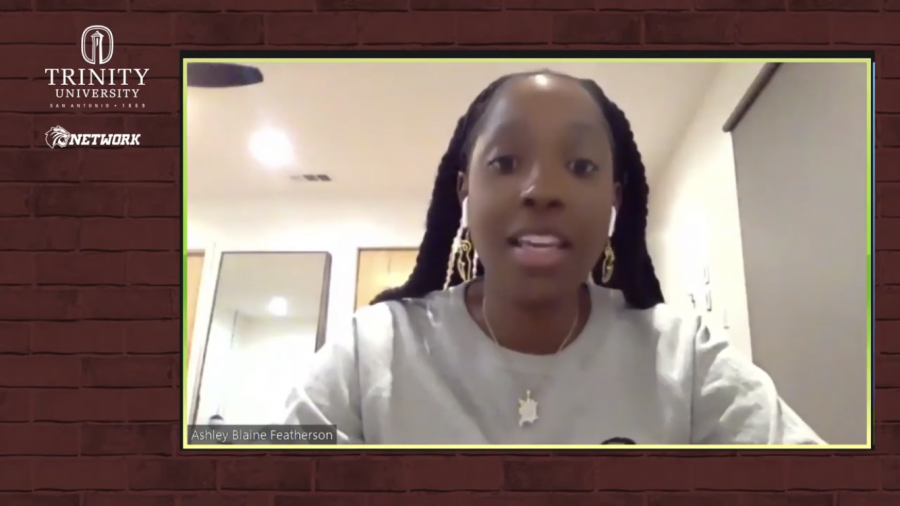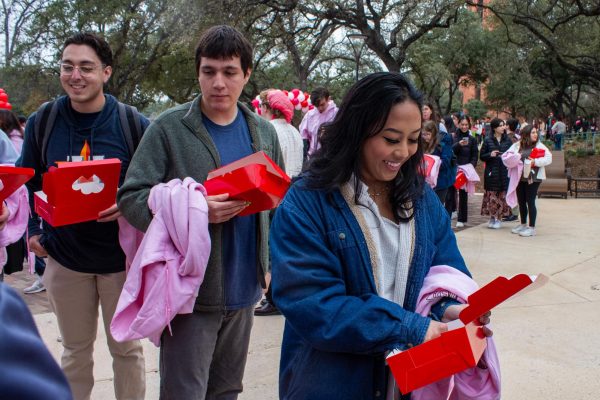Actress Ashley Blaine Featherson from “Dear White People” served as Trinity’s 2021 MLK commemorative lecturer
The actress, singer and producer talked about Dr. King’s “I Have A Dream” speech and the importance of intersectionality in diversity work
Despite the obstacles of the COVID-19 pandemic, Trinity University, partnered with the City of San Antonio MLK Jr. Commission, is continuing their annual tradition of hosting an MLK commemorative lecturer. This year’s guest speaker was actress, singer and producer Ashley Blaine Featherson, best known for the American comedy-drama Netflix series “Dear White People.”
Featherson plays Joelle Brooks, a student at Winchester University who is a co-host of the campus radio show, “Dear White People.” The show is centered around undergraduate students who are trying to figure out how to make space for themselves “in institutions that once owned slaves.” “Though Winchester is a fake university, it’s a real experience,” said Featherson. According to her, “Dear White People” “puts everything in your face.”
Featherson began her lecture by reminiscing on the COVID-19 pandemic.
“We’re in such an interesting time, you know, we are almost a year into the pandemic. And with that there’s been a lot of sadness, there’s been a lot of growth, a lot of change, a lot of disappointment. But also I think that it has caused us to have an extreme amount of hope because hope is all that we’ve truly had to hold onto.”
The actress and producer shared a popular quote from Martin Luther King Jr’s 1963 “I Have a Dream” speech.
“I have a dream that my four little children will one day live in a nation where they will not be judged by the color of their skin, but by the content of their character.”
Featherson shared that though a lot of progress has been made over the decades, there’s still plenty of work to be done, especially since she shares the same dream as the late Dr. King.
“I have the same dream. And, what that means is, although we’ve come a long way, we have a long way to go if I still have the exact same dream in 2021. You know, tomorrow we will see Kamala Harris be inaugurated as the first woman, the first woman of color, the first woman of Asian and Caribbean descent. I mean the list goes on but she’s the first, but we must ensure that she’s not the last.”
Though 2020 brought police brutality discussions to the forefront, Featherson explained that activists must be intersectional in all aspects of their work, including, as she talked about, being transparent about salary inequality.
“A big thing, particularly in entertainment is that a lot of us are fighting for pay equality. We are realizing that women, and especially women of color, Black and Latino women are paid considerably less than anybody else.”
Featherson shared one of the ways she believes pay discrepancies can be addressed. According to her, “no one can start making the money they deserve” if people in the workplace do not start talking about the salaries they make.
“We have to start incorporating pay transparency, salary transparency. It’s uncomfortable, a lot of us are not used to this. We, you know, we come from parents and from a time where you do not talk about money and finances.”
Featherson shared that although people often think of inclusion as alluding to ethnicity, there are so many more wide-ranging issues that are stigmatized in our culture, including people with mental and physical disabilities. “Simply because we look different isn’t enough of a reason to discriminate against people.”
When asked about her dream role in the Q&A session, Featherson shared that her ideal role would be one that combined three of her passions. “Just a show where I would be able to do all three things that I love which is act, sing and dance.” Though the actress is best known for “Dear White People,” she also appeared on an episode of Glee in 2009.










